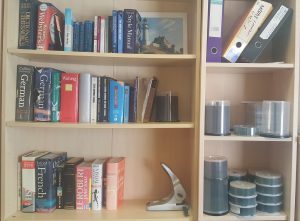
Be adaptable and ready to (re)learn: You may have spent days polishing a translation assignment at university, but now you have to work to tight deadlines and your translation needs to be fit for purpose and in line with customer specifications. You will need to adapt your approach, research process, tone and register for different texts and customers – don’t be too precious about your work and don’t take constructive criticism personally!
It’s not all black and white: At university it is easy to fall into the trap of thinking that there is one right answer, and it’s the one written in red pen by your tutor in the margins of your translation. In reality, translation is rarely such a black-and-white matter and you will spend a lot of time exploring the grey areas in between. You will never be able to know everything about everything – you just have to do all you can to ensure that your translation is accurate and appropriate.
Get the most out of your research: Rather than blindly plugging your source term into an online dictionary, think about the most efficient way of finding the target equivalent. Should you go straight to a company website or an international standard? Use the source text as reference material – search for your source term elsewhere in the file and you may find it used in a way that sheds light on the meaning or even provides a definition. Use a monolingual dictionary to make sure you know exactly what the source term means. Using these methods makes it much easier to find the right target equivalent for the context in question.
Perfect your target language skills: Refining your knowledge of your target language is just as important as gaining proficiency in the source language, if not even more so. Use monolingual dictionaries in this case too to make sure your chosen target term actually means what you think it means. Don’t assume that you know everything there is to know about your target language. If you are revising a translator’s work or checking a translation memory match and a term or phrase doesn’t sound familiar, look it up before assuming you should change it. Just because you wouldn’t use a particular word doesn’t mean that it’s wrong. Be objective and willing to learn!
Take a step back: It’s easy to become obsessed with small details when you’re a pedant and a perfectionist (and we all are!). You can end up focusing on one particular term to the detriment of the overall sentence or paragraph. Remember to reread everything you write, especially if you have been making lots of changes, as errors can easily slip through when you are working quickly. Taking a step back also involves applying some common sense – the customer glossary or online dictionary might be telling you to use a particular term, but does it actually make sense here? You might have spent so long working on a text that you’ve got too close to it – take a step back and put yourself in the reader’s shoes to make sure your meaning is clear. Avoid tunnel vision and think of the bigger picture!
